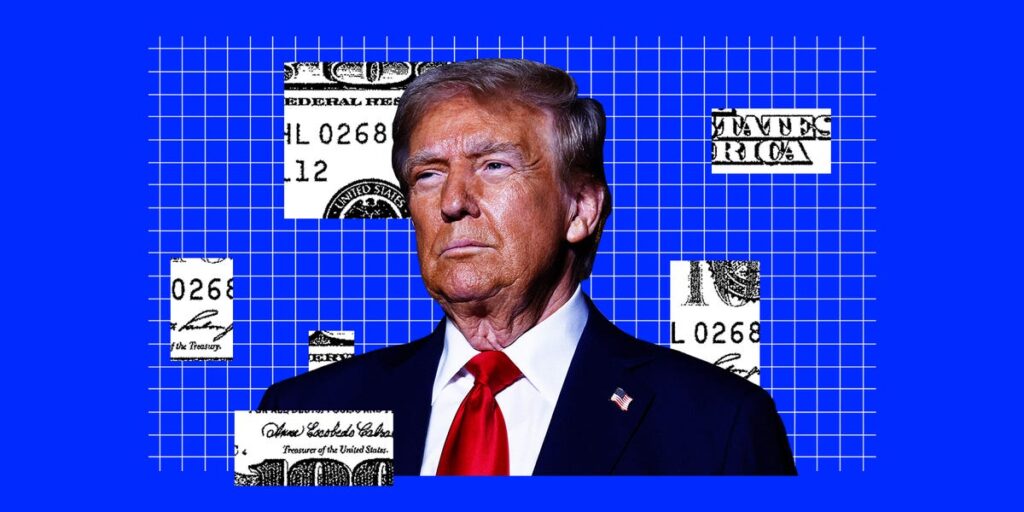President Donald Trump has said he will impose tariffs on imported goods. Companies are already claiming the proposal would raise prices for consumers. The Federal Reserve will likely respond to inflation by raising interest rates to suppress demand.
One of the first policies President-elect Donald Trump expects to implement after taking the oath of office is to increase taxes on imported goods.
Many economists say these tariffs and his other proposals could cause another round of inflation and higher interest rates.
President Trump said his proposal would not affect U.S. prices. “We’re going to impose tariffs on other countries that come into our country, but that has nothing to do with taxes for us. It’s a tax on other countries,” he said in a speech in August.
Some experts say otherwise. Economists and investors expect these tax increases on imported goods will be passed on to U.S. consumers in the form of higher prices. Some companies have already warned of price increases. In such a scenario, economic knock-on effects could result in households paying higher interest rates on all types of borrowings as the Fed moves to curb a resurgence in inflation.
Tightening tariffs from President Trump’s first term are expected to put pressure on Americans’ wallets.
During his campaign, one of President Trump’s cornerstone proposals was to impose a 60% tariff on imports from China and 10-20% tariffs on imports from other countries.
Related articles
The U.S. Census Bureau reported that broad-based tariffs are likely to affect prices of automobiles, human and veterinary medicines, food and beverages, furniture, and consumer electronics.
President Trump could announce these changes soon after taking office, as they do not require Congressional approval. However, implementation takes time, so consumers won’t see higher prices right away.
Still, the Washington Post reported in late October that some companies have already begun adjusting their business plans in anticipation of President Trump’s tariff proposals. Autozone, an auto parts retailer, is also preparing to raise prices.
“If tariffs are imposed, we will pass the cost of those tariffs on to consumers,” AutoZone CEO Philip Daniele said at a pre-election earnings conference.
Stanley Black & Decker told investors it would likely need to adjust prices to offset new tariffs, and Columbia Sportswear already has plans to do so, the Post reported. Ta.
“We’re going to raise our prices,” Columbia CEO Timothy Boyle told the Post. “It’s going to be very difficult to keep our products affordable for Americans.” added.
The market appears to be bracing for inflation, with yields on 2-year, 10-year, and 30-year bonds rising sharply following the news of Trump’s victory. If prices start to rise, the Fed could eventually be forced to raise interest rates, which would mean higher borrowing costs for U.S. consumers and businesses. This includes mortgage interest rates, which are on track to exceed 7%.
An analysis by the nonpartisan Peterson Institute looked at President Trump’s proposed 60% tariffs on Chinese imports and estimated that they would boost inflation by 0.4 percentage points in 2025. This estimate does not include President Trump’s proposal for 10% to 20% tariffs on other imports. .
An analysis by the nonpartisan Tax Policy Center found that President Trump’s policies would reduce after-tax income by an average of $1,800 in 2025. A separate analysis by the left-leaning Center for American Progress found that Trump’s tariff plan could cost the average American household an additional $1,500. One year.
The Tax Foundation estimated that during President Trump’s first term, tariffs represented an additional cost to Americans, acting as nearly $80 billion in increased taxes for Americans buying imports from China.
But there’s a catch. The tariffs enacted during President Trump’s first term did not significantly increase inflation. What’s different this time around, and why the inflation forecast is sharper, is how much deeper and broader Trump’s tariff proposals would be, not just for China but for the rest of the world.
Trump’s victory is expected to have an impact on the Federal Reserve’s future interest rate decisions. Although it is too early for the Fed to make any adjustments, members of the Federal Open Market Committee will soon discuss how President Trump’s economic policies are likely to affect consumers. This could start a debate (such as whether banks need to raise interest rates).
The Fed is expected to cut interest rates by 25 basis points on Thursday, and Fed Chairman Jerome Powell is expected to provide some insight into the Fed’s direction after Trump’s victory.
But the Fed’s future under the Trump administration is uncertain. He has previously indicated he wants to have a say in interest rate decisions, something the president has not had before. This raises the question of whether central banks will remain politically independent.
Americans will learn more about what to expect from President Trump as the year draws to a close. Nobel Memorial Prize-winning economist Joseph Stiglitz has argued that his policies will help the economy and make Americans better off, but experts believe a Trump administration will lead to more inflation. That’s the consensus, he previously told Business Insider.
“A rough assessment of the outcome is that the Fed will be forced to raise rates,” he said, adding that “even if unemployment rises and GDP slows, all of this combined will still push inflation higher. Deaf,” he said.




